Private Law Assignment: Conventions, Investment Contracts Analysis
VerifiedAdded on 2022/09/22
|6
|1106
|17
Homework Assignment
AI Summary
This private law assignment delves into two key areas: conventions and investment contracts. The first part examines conventions as a source of international law, focusing on their interpretation based on the Vienna Convention on the Law of Treaties, including general rules, supplementary means, and the handling of multiple language versions. The second part explores different types of investment contracts, such as stock purchase agreements, and outlines their formation, applicable law, and crucial clauses like stabilization and renegotiation clauses. The assignment provides a comprehensive overview of the legal aspects of conventions and investment contracts, referencing relevant articles and legal concepts.
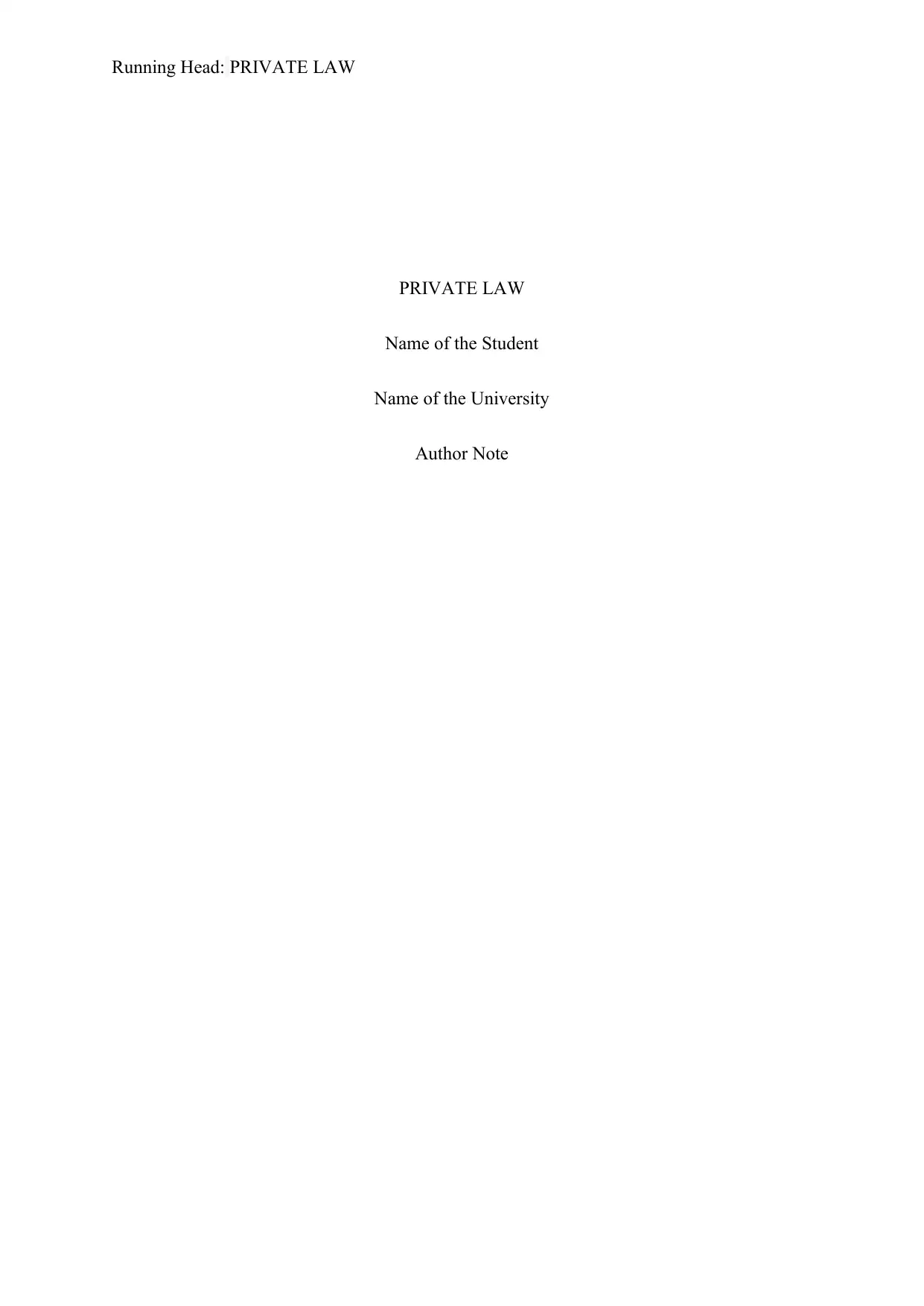
Running Head: PRIVATE LAW
PRIVATE LAW
Name of the Student
Name of the University
Author Note
PRIVATE LAW
Name of the Student
Name of the University
Author Note
Paraphrase This Document
Need a fresh take? Get an instant paraphrase of this document with our AI Paraphraser
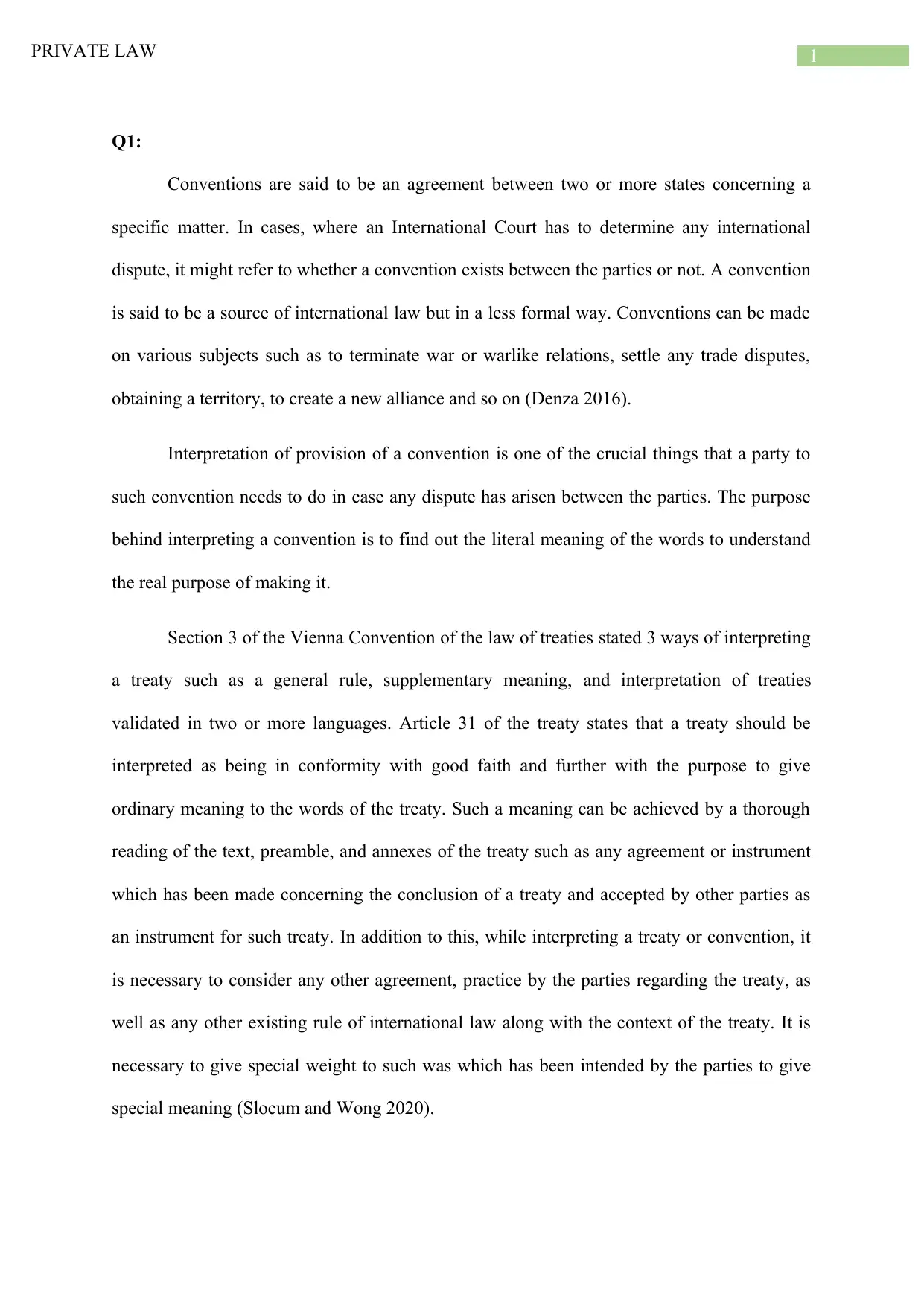
1PRIVATE LAW
Q1:
Conventions are said to be an agreement between two or more states concerning a
specific matter. In cases, where an International Court has to determine any international
dispute, it might refer to whether a convention exists between the parties or not. A convention
is said to be a source of international law but in a less formal way. Conventions can be made
on various subjects such as to terminate war or warlike relations, settle any trade disputes,
obtaining a territory, to create a new alliance and so on (Denza 2016).
Interpretation of provision of a convention is one of the crucial things that a party to
such convention needs to do in case any dispute has arisen between the parties. The purpose
behind interpreting a convention is to find out the literal meaning of the words to understand
the real purpose of making it.
Section 3 of the Vienna Convention of the law of treaties stated 3 ways of interpreting
a treaty such as a general rule, supplementary meaning, and interpretation of treaties
validated in two or more languages. Article 31 of the treaty states that a treaty should be
interpreted as being in conformity with good faith and further with the purpose to give
ordinary meaning to the words of the treaty. Such a meaning can be achieved by a thorough
reading of the text, preamble, and annexes of the treaty such as any agreement or instrument
which has been made concerning the conclusion of a treaty and accepted by other parties as
an instrument for such treaty. In addition to this, while interpreting a treaty or convention, it
is necessary to consider any other agreement, practice by the parties regarding the treaty, as
well as any other existing rule of international law along with the context of the treaty. It is
necessary to give special weight to such was which has been intended by the parties to give
special meaning (Slocum and Wong 2020).
Q1:
Conventions are said to be an agreement between two or more states concerning a
specific matter. In cases, where an International Court has to determine any international
dispute, it might refer to whether a convention exists between the parties or not. A convention
is said to be a source of international law but in a less formal way. Conventions can be made
on various subjects such as to terminate war or warlike relations, settle any trade disputes,
obtaining a territory, to create a new alliance and so on (Denza 2016).
Interpretation of provision of a convention is one of the crucial things that a party to
such convention needs to do in case any dispute has arisen between the parties. The purpose
behind interpreting a convention is to find out the literal meaning of the words to understand
the real purpose of making it.
Section 3 of the Vienna Convention of the law of treaties stated 3 ways of interpreting
a treaty such as a general rule, supplementary meaning, and interpretation of treaties
validated in two or more languages. Article 31 of the treaty states that a treaty should be
interpreted as being in conformity with good faith and further with the purpose to give
ordinary meaning to the words of the treaty. Such a meaning can be achieved by a thorough
reading of the text, preamble, and annexes of the treaty such as any agreement or instrument
which has been made concerning the conclusion of a treaty and accepted by other parties as
an instrument for such treaty. In addition to this, while interpreting a treaty or convention, it
is necessary to consider any other agreement, practice by the parties regarding the treaty, as
well as any other existing rule of international law along with the context of the treaty. It is
necessary to give special weight to such was which has been intended by the parties to give
special meaning (Slocum and Wong 2020).
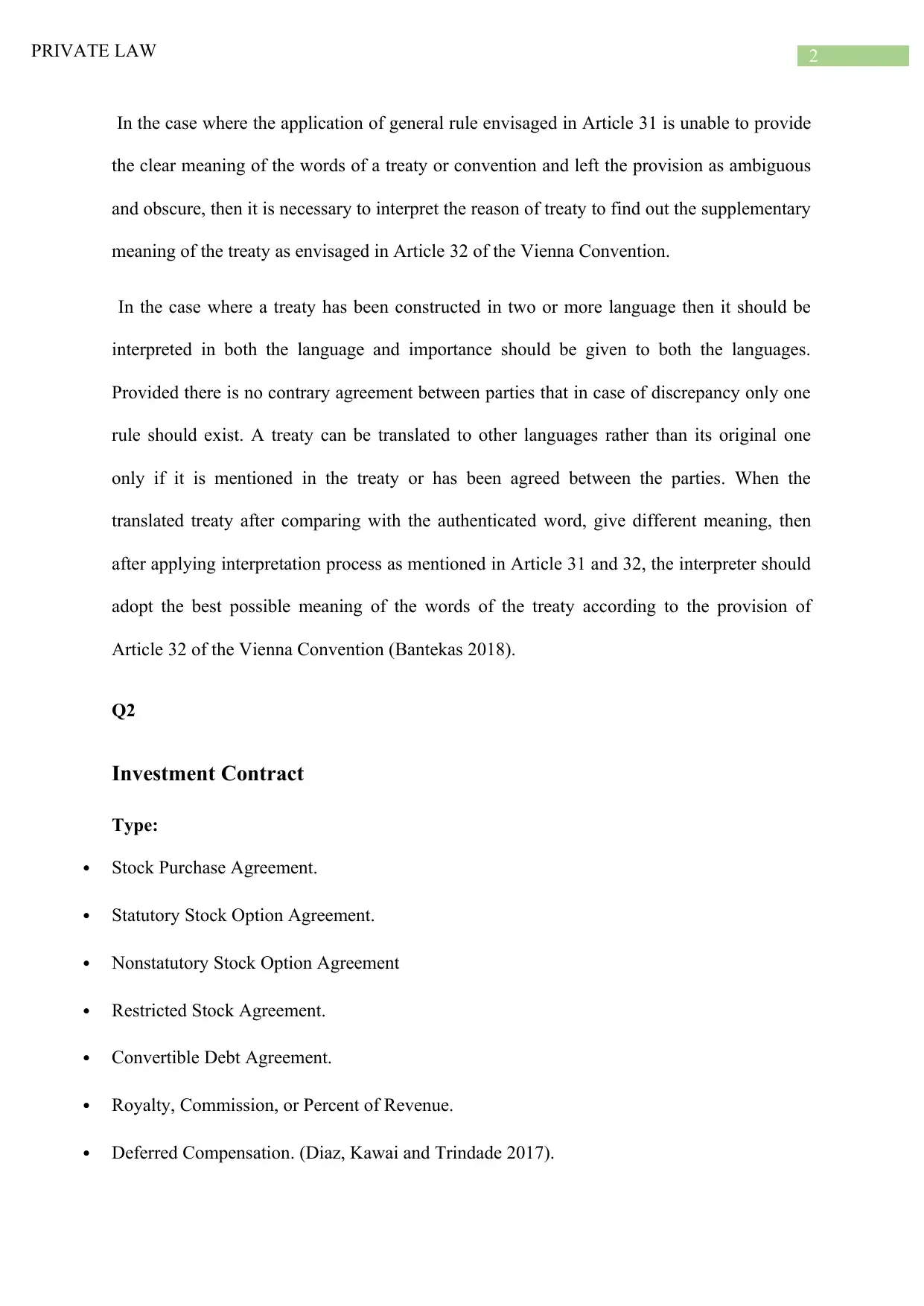
2PRIVATE LAW
In the case where the application of general rule envisaged in Article 31 is unable to provide
the clear meaning of the words of a treaty or convention and left the provision as ambiguous
and obscure, then it is necessary to interpret the reason of treaty to find out the supplementary
meaning of the treaty as envisaged in Article 32 of the Vienna Convention.
In the case where a treaty has been constructed in two or more language then it should be
interpreted in both the language and importance should be given to both the languages.
Provided there is no contrary agreement between parties that in case of discrepancy only one
rule should exist. A treaty can be translated to other languages rather than its original one
only if it is mentioned in the treaty or has been agreed between the parties. When the
translated treaty after comparing with the authenticated word, give different meaning, then
after applying interpretation process as mentioned in Article 31 and 32, the interpreter should
adopt the best possible meaning of the words of the treaty according to the provision of
Article 32 of the Vienna Convention (Bantekas 2018).
Q2
Investment Contract
Type:
Stock Purchase Agreement.
Statutory Stock Option Agreement.
Nonstatutory Stock Option Agreement
Restricted Stock Agreement.
Convertible Debt Agreement.
Royalty, Commission, or Percent of Revenue.
Deferred Compensation. (Diaz, Kawai and Trindade 2017).
In the case where the application of general rule envisaged in Article 31 is unable to provide
the clear meaning of the words of a treaty or convention and left the provision as ambiguous
and obscure, then it is necessary to interpret the reason of treaty to find out the supplementary
meaning of the treaty as envisaged in Article 32 of the Vienna Convention.
In the case where a treaty has been constructed in two or more language then it should be
interpreted in both the language and importance should be given to both the languages.
Provided there is no contrary agreement between parties that in case of discrepancy only one
rule should exist. A treaty can be translated to other languages rather than its original one
only if it is mentioned in the treaty or has been agreed between the parties. When the
translated treaty after comparing with the authenticated word, give different meaning, then
after applying interpretation process as mentioned in Article 31 and 32, the interpreter should
adopt the best possible meaning of the words of the treaty according to the provision of
Article 32 of the Vienna Convention (Bantekas 2018).
Q2
Investment Contract
Type:
Stock Purchase Agreement.
Statutory Stock Option Agreement.
Nonstatutory Stock Option Agreement
Restricted Stock Agreement.
Convertible Debt Agreement.
Royalty, Commission, or Percent of Revenue.
Deferred Compensation. (Diaz, Kawai and Trindade 2017).
⊘ This is a preview!⊘
Do you want full access?
Subscribe today to unlock all pages.

Trusted by 1+ million students worldwide
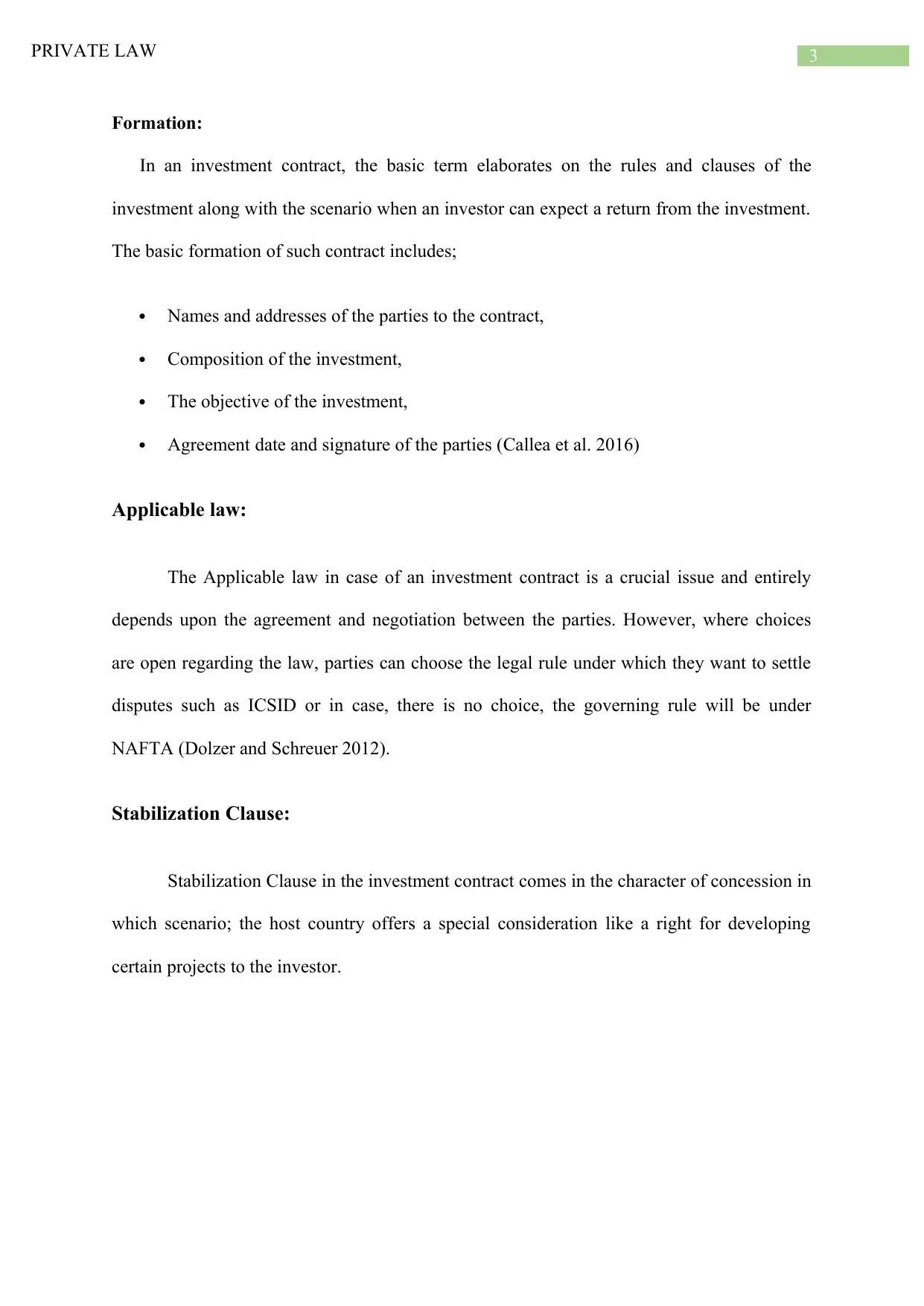
3PRIVATE LAW
Formation:
In an investment contract, the basic term elaborates on the rules and clauses of the
investment along with the scenario when an investor can expect a return from the investment.
The basic formation of such contract includes;
Names and addresses of the parties to the contract,
Composition of the investment,
The objective of the investment,
Agreement date and signature of the parties (Callea et al. 2016)
Applicable law:
The Applicable law in case of an investment contract is a crucial issue and entirely
depends upon the agreement and negotiation between the parties. However, where choices
are open regarding the law, parties can choose the legal rule under which they want to settle
disputes such as ICSID or in case, there is no choice, the governing rule will be under
NAFTA (Dolzer and Schreuer 2012).
Stabilization Clause:
Stabilization Clause in the investment contract comes in the character of concession in
which scenario; the host country offers a special consideration like a right for developing
certain projects to the investor.
Formation:
In an investment contract, the basic term elaborates on the rules and clauses of the
investment along with the scenario when an investor can expect a return from the investment.
The basic formation of such contract includes;
Names and addresses of the parties to the contract,
Composition of the investment,
The objective of the investment,
Agreement date and signature of the parties (Callea et al. 2016)
Applicable law:
The Applicable law in case of an investment contract is a crucial issue and entirely
depends upon the agreement and negotiation between the parties. However, where choices
are open regarding the law, parties can choose the legal rule under which they want to settle
disputes such as ICSID or in case, there is no choice, the governing rule will be under
NAFTA (Dolzer and Schreuer 2012).
Stabilization Clause:
Stabilization Clause in the investment contract comes in the character of concession in
which scenario; the host country offers a special consideration like a right for developing
certain projects to the investor.
Paraphrase This Document
Need a fresh take? Get an instant paraphrase of this document with our AI Paraphraser
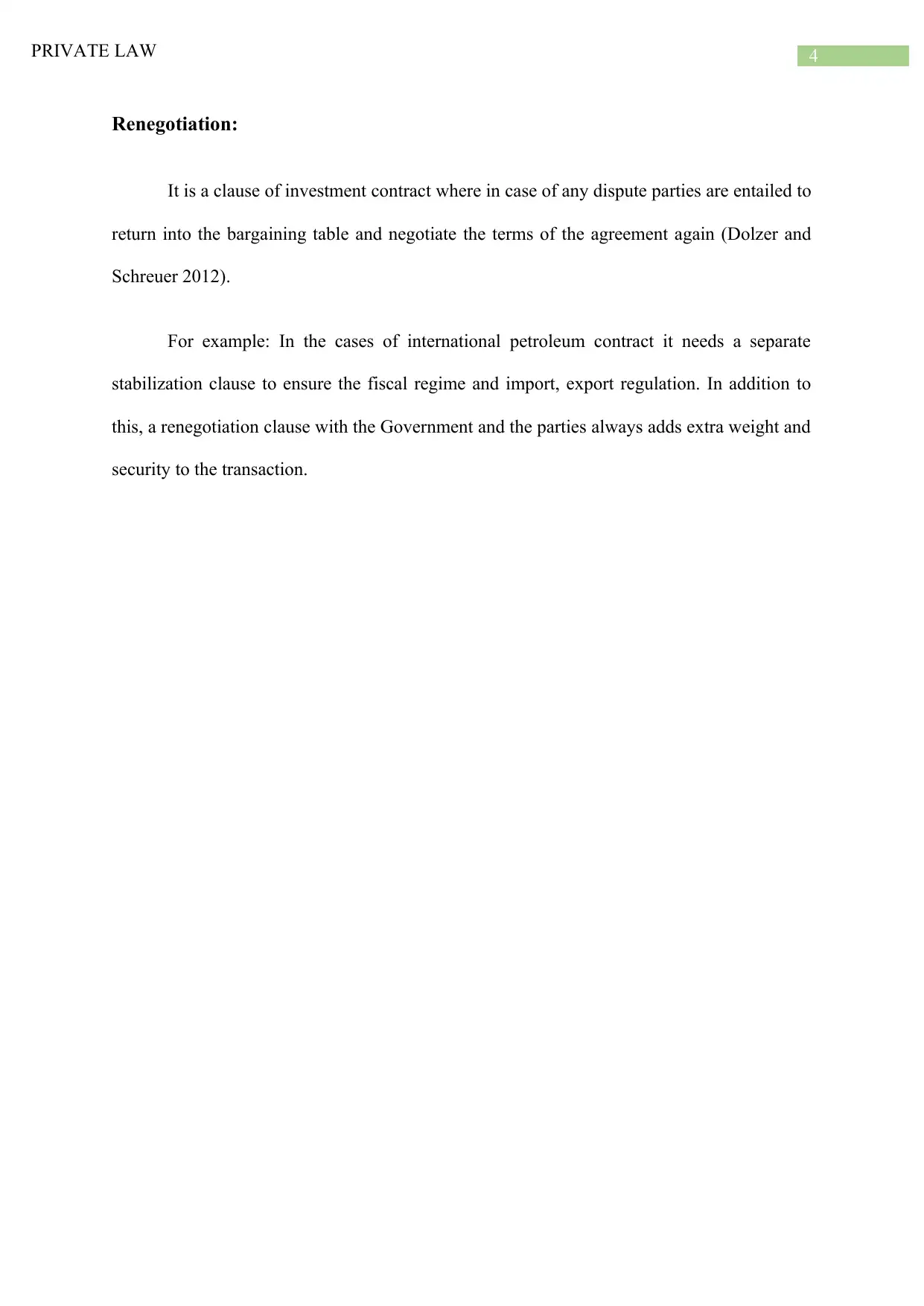
4PRIVATE LAW
Renegotiation:
It is a clause of investment contract where in case of any dispute parties are entailed to
return into the bargaining table and negotiate the terms of the agreement again (Dolzer and
Schreuer 2012).
For example: In the cases of international petroleum contract it needs a separate
stabilization clause to ensure the fiscal regime and import, export regulation. In addition to
this, a renegotiation clause with the Government and the parties always adds extra weight and
security to the transaction.
Renegotiation:
It is a clause of investment contract where in case of any dispute parties are entailed to
return into the bargaining table and negotiate the terms of the agreement again (Dolzer and
Schreuer 2012).
For example: In the cases of international petroleum contract it needs a separate
stabilization clause to ensure the fiscal regime and import, export regulation. In addition to
this, a renegotiation clause with the Government and the parties always adds extra weight and
security to the transaction.
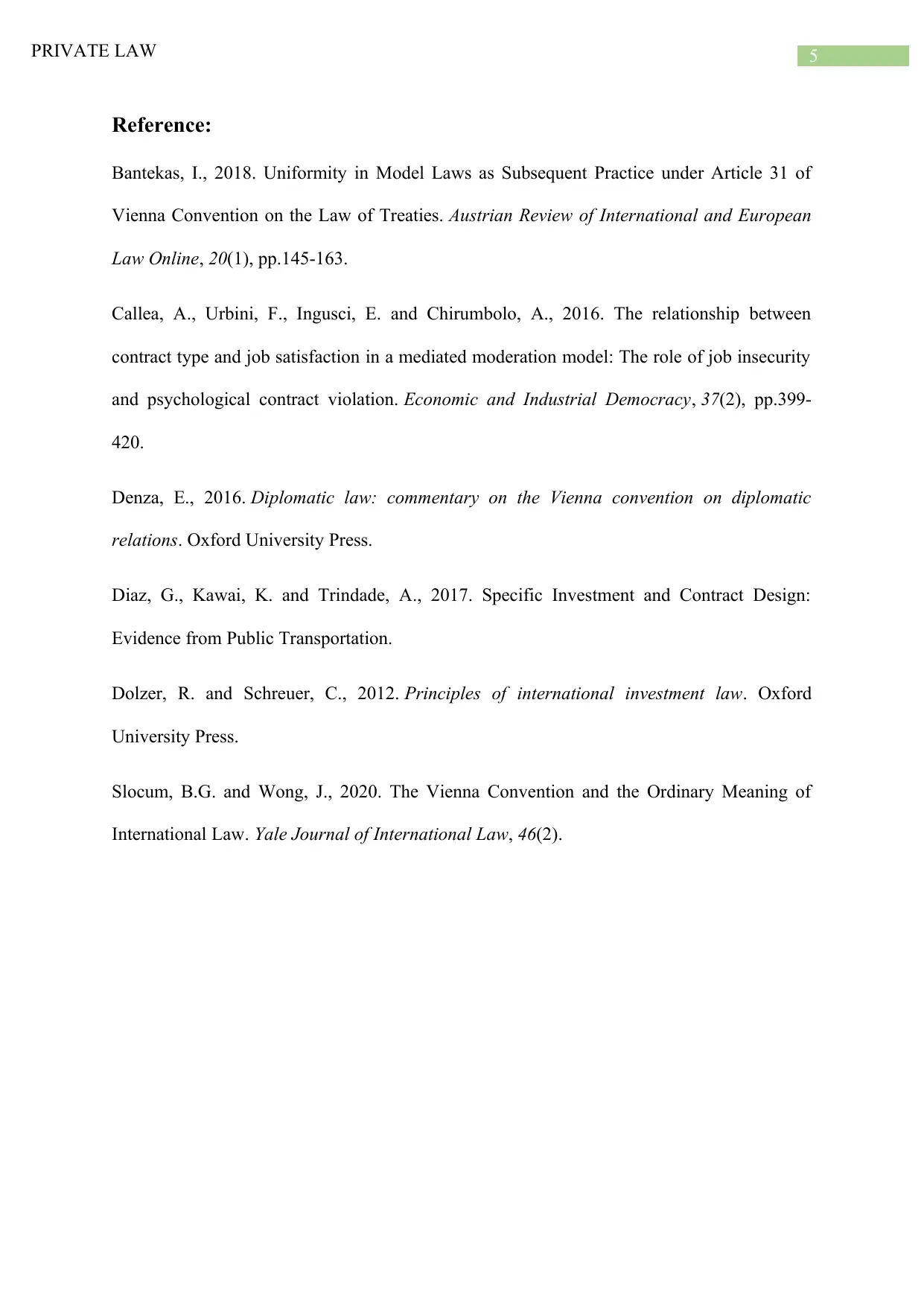
5PRIVATE LAW
Reference:
Bantekas, I., 2018. Uniformity in Model Laws as Subsequent Practice under Article 31 of
Vienna Convention on the Law of Treaties. Austrian Review of International and European
Law Online, 20(1), pp.145-163.
Callea, A., Urbini, F., Ingusci, E. and Chirumbolo, A., 2016. The relationship between
contract type and job satisfaction in a mediated moderation model: The role of job insecurity
and psychological contract violation. Economic and Industrial Democracy, 37(2), pp.399-
420.
Denza, E., 2016. Diplomatic law: commentary on the Vienna convention on diplomatic
relations. Oxford University Press.
Diaz, G., Kawai, K. and Trindade, A., 2017. Specific Investment and Contract Design:
Evidence from Public Transportation.
Dolzer, R. and Schreuer, C., 2012. Principles of international investment law. Oxford
University Press.
Slocum, B.G. and Wong, J., 2020. The Vienna Convention and the Ordinary Meaning of
International Law. Yale Journal of International Law, 46(2).
Reference:
Bantekas, I., 2018. Uniformity in Model Laws as Subsequent Practice under Article 31 of
Vienna Convention on the Law of Treaties. Austrian Review of International and European
Law Online, 20(1), pp.145-163.
Callea, A., Urbini, F., Ingusci, E. and Chirumbolo, A., 2016. The relationship between
contract type and job satisfaction in a mediated moderation model: The role of job insecurity
and psychological contract violation. Economic and Industrial Democracy, 37(2), pp.399-
420.
Denza, E., 2016. Diplomatic law: commentary on the Vienna convention on diplomatic
relations. Oxford University Press.
Diaz, G., Kawai, K. and Trindade, A., 2017. Specific Investment and Contract Design:
Evidence from Public Transportation.
Dolzer, R. and Schreuer, C., 2012. Principles of international investment law. Oxford
University Press.
Slocum, B.G. and Wong, J., 2020. The Vienna Convention and the Ordinary Meaning of
International Law. Yale Journal of International Law, 46(2).
⊘ This is a preview!⊘
Do you want full access?
Subscribe today to unlock all pages.

Trusted by 1+ million students worldwide
1 out of 6
Related Documents
Your All-in-One AI-Powered Toolkit for Academic Success.
+13062052269
info@desklib.com
Available 24*7 on WhatsApp / Email
![[object Object]](/_next/static/media/star-bottom.7253800d.svg)
Unlock your academic potential
Copyright © 2020–2026 A2Z Services. All Rights Reserved. Developed and managed by ZUCOL.





